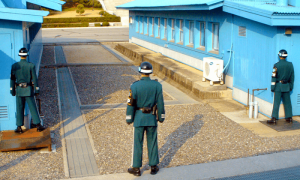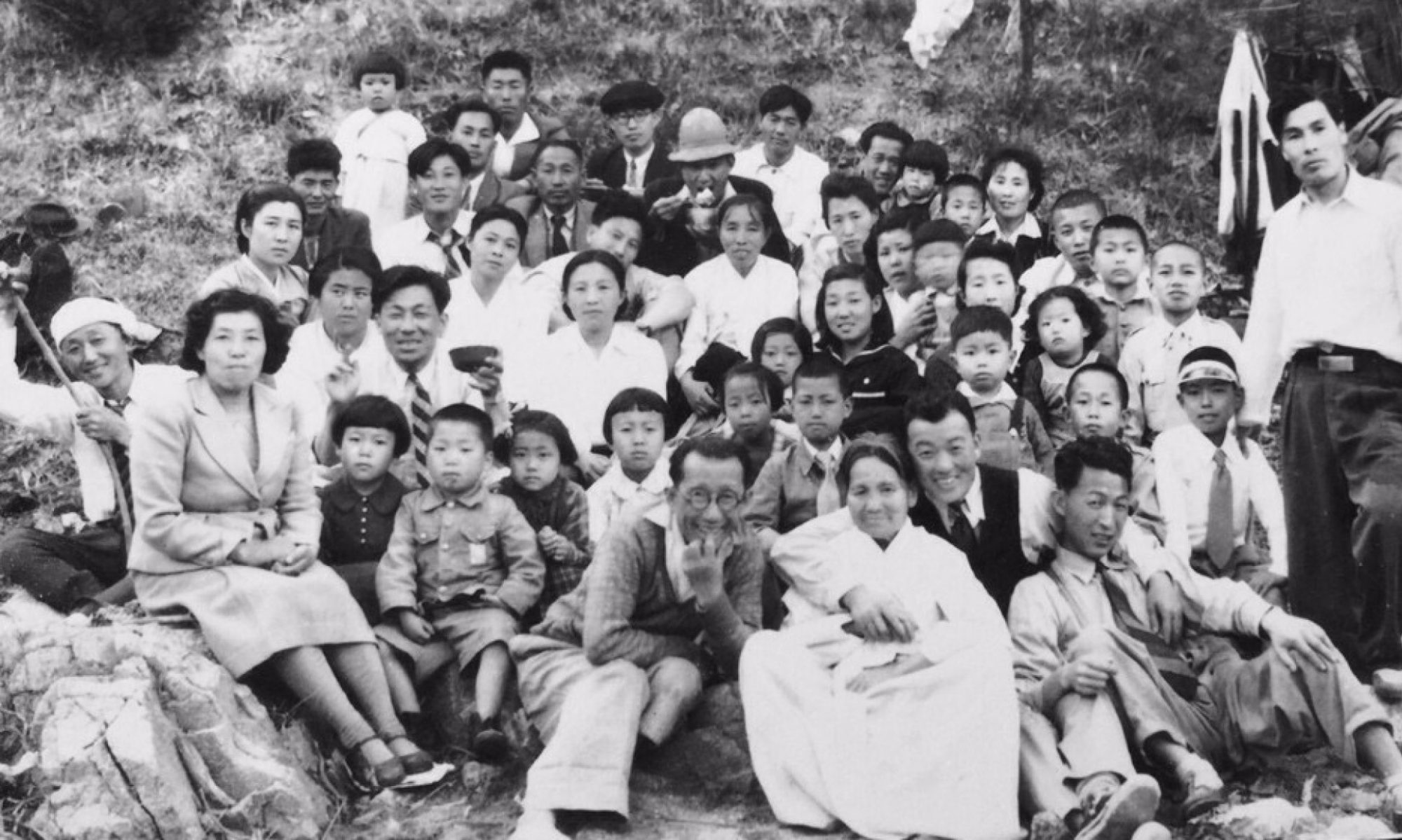If a story is never told, it becomes forgotten.
The year was 1950 when a six-year-old girl awoke from her sleep to the sounds of bombs shaking the earth. North Korea marched into Seoul, South Korea starting a war that, beyond metaphorically, would never end. Her mother grabbed her hand pulling her into the darkness of the night, running into the woods and placing her only daughter by a tree insisting that she wait for her return. The little girl’s mother would then forever remain missing while her father lost his life fighting for his country. She was orphaned and lived out the rest of her life unsure about her mother’s disappearance.
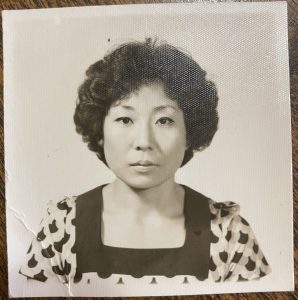
Shi Won Kim, Korean War Survivor
This child was my grandmother, Shi Won Kim, a survivor of the Korean War or as many refer to as The Forgotten War. The first time I asked my grandmother about her upbringing, the traumatic moments still brought tears to her eyes as her broken English muttered the heartbreaking tragedy. For someone who remained emotionally scarred 60 years after, it puts into question whether the war is “forgotten” for those who were forcibly affected.

Whether any war should be coined “forgotten” is a question in itself, but the reasoning behind this label lies in the fact that till this day, 70 years later, the war is still not over. Although fighting has come to a ceasefire, North and South Korea exist in stalemate with tensions as cold as Israel and Palestine.
The preamble for the war takes root in the destructive nature of colonization and imperialistic ideals that swept the world during the first half of the 20th century. Japan colonized Korea in 1910 and remained in power until the end of World War II in which their defeat caused them to lose the territory. However, Korea was still not in complete liberation as it was the “ingenious” idea of the victors to separate the country in half leading to a Soviet-occupied North and an American-occupied South, or in other words a strictly Communist regime bordered by a liberal, democratic country. What could go wrong?
It was June of 1950 when North Korea, under then leader Kim Il Sung, brought its troops into South Korea igniting a war that would last in combat for three years. Won Park, my paternal grandfather remembers the day the war was declared when he was the age of 16.
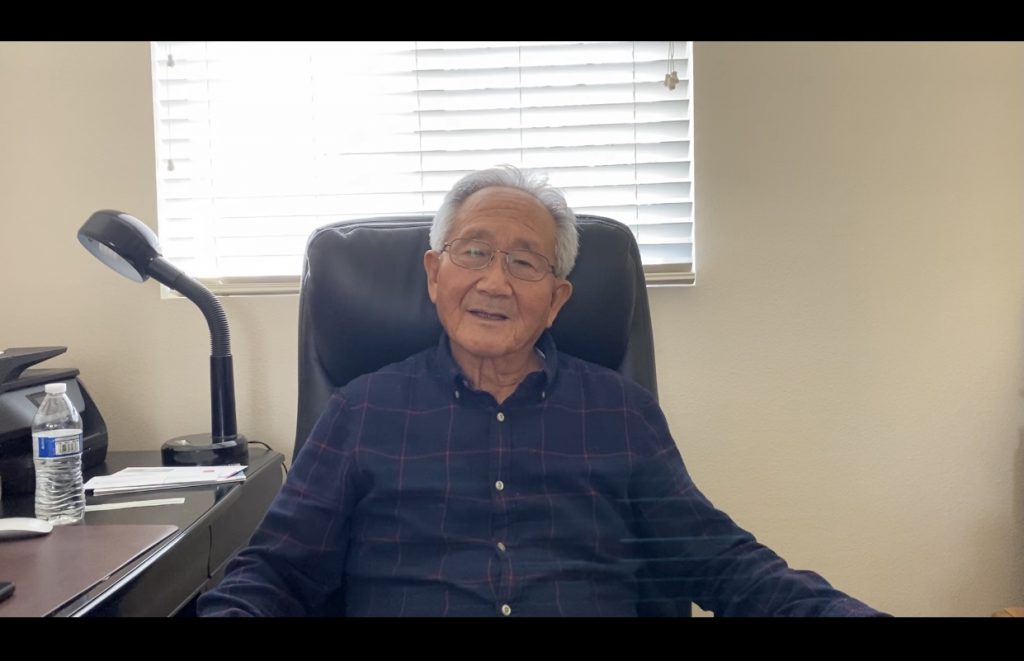
“North Korea came to Seoul and they arrested the people and drafted them,” said Park.
“If I was tall I could have been drafted because they were arresting people, but I was small” he chuckled.
Park was born in North Korea, but luckily for him, his family decided to flee South. It was a treacherous journey to escape the now Communist state and the family used a paddle boat to sail on the ocean in order to safely cross the 38th parallel and reach South Korea. My grandfather was 12 at the time and his younger sister eight. He is grateful for the refugee camp that was stationed in South Korea for those fleeing the North as he attributes this to his family being able to regain their strength.
Within the first month of the war, North Korea took over the city of Seoul where he lived and kept control of it for about three months. He remembers the period as one that was particularly troubling.
“They [Seoul] had no supply of food, that’s the main thing; we would get clothes and machines from the countryside and whatever else we could bargain to get some rice and vegetables and so on” said Park
“Just before the UN came in, we had starved for about one week” he added.
During this time, the Communists drafted men residing in my grandfather’s city, training them and forcing them into combat. When the UN arrived to liberate the city, these drafted men were quickly killed by the Communists.
Similar to Park, Heung Soo Kim was a teenager during the start of the Korean War. At the age of 13, Kim fled from the North Korean forces and was disastrously separated from his family.
“When the North Korean soldiers attacked South Korea, our family moved down to the South driven by the North Korean soldiers, but on the way, because of the bombs and attacks, I was separated from my family members and I became a beggar on the street, begging for food and sleeping on the street for almost six months” said Kim.
Fortunately, Kim was reunited with his family at a refugee camp in Tai John City during Christmas time. To this day, he vividly remembers the tears and embrace his mother gave him upon his return.
“She whispered in my ear ‘God answered my prayers and now you have returned as a most wonderful Christmas gift'” described Kim.
Under Harry S. Truman and General Douglas MacArthur, American forces worked with South Korea to push North Korean forces all the way to the Chinese border. However, ignoring orders, MacArthur followed his own will and made the fateful decision to bomb Chinese bases that were providing aid to the remaining North Korean troops. Once China was involved, South Korea rapidly lost its gains as if they landed on a chute in a game of chutes & ladders. The North had pushed the South all the way back to the 38th parallel, nearly the starting point of where the war had begun.
“We had starved for about one week”
Won Park
In 1953, an armistice was agreed upon by the United Nations, China and the Democratic People’s Republic of Korea [North Korea], although no formal peace treaty was ever signed by South Korea. The infamous, two-mile-long Demilitarized Zone was established and stalemate became normalcy.
For the main countries involved, it appears that each owns a narrative that is slightly skewed from the other. In American history, the war marks the turn of the Cold War in which contention peaked between the Soviet Union and the United States. The Korean War was the first wrung in the containment strategy of Presidents Truman, Eisenhower and Johnson.
American troops remain in South Korea today, but the details of the war are largely overshadowed by the following Vietnam War and the agreement of stalemate has become a forgotten issue too large to tackle or provide with a second-thought. The necessity to become involved in the war is often claimed to be because of the humanitarian crisis at hand, however many largely question whether the involvement can be more so attributed to purely America’s agenda of weakening the influence of the Soviet Union.
There is a duality of beliefs behind the reasons for America’s involvement in the war. The older generation who survived the war are immensely grateful to the Americans for their aid and troops. However, many liberals today in South Korea view the involvement in hindsight from a different angle. For them, it is difficult to overlook that if the U.S. had not split the country after World War II, the totality of the war may have been avoided.
The Korean War involved immense civilian massacre with a higher percentage of civilians killed than in World War II and the Vietnam War, however very little know of this fact. The minimization of this fact allows for America to push the narrative that they fought for South Korea for humanitarian reasons with greater ease.
Christian Caruso, a high school junior currently studying American history describes how the topic of the Korean War was taught to him in the classroom.
“There was about a paragraph about the Korean War, I don’t really remember much” said Caruso.
For North Koreans, the conversation is immensely different.
“The Korean War is pretty much taught as being South Korea’s fault in that the South Korea militia invaded and that the North was pretty much defending themselves” said Jay Lee the president of the Liberty in North Korea club at the University of Southern California.
North Korea has adopted an ideology known as juche, which creates a narrative that it is them against the world. This willingness to isolate can be seen as stubbornness from the Kim dynasty, but it is also a reminder of the deep, generational trauma living in Koreans from years of imperialism.
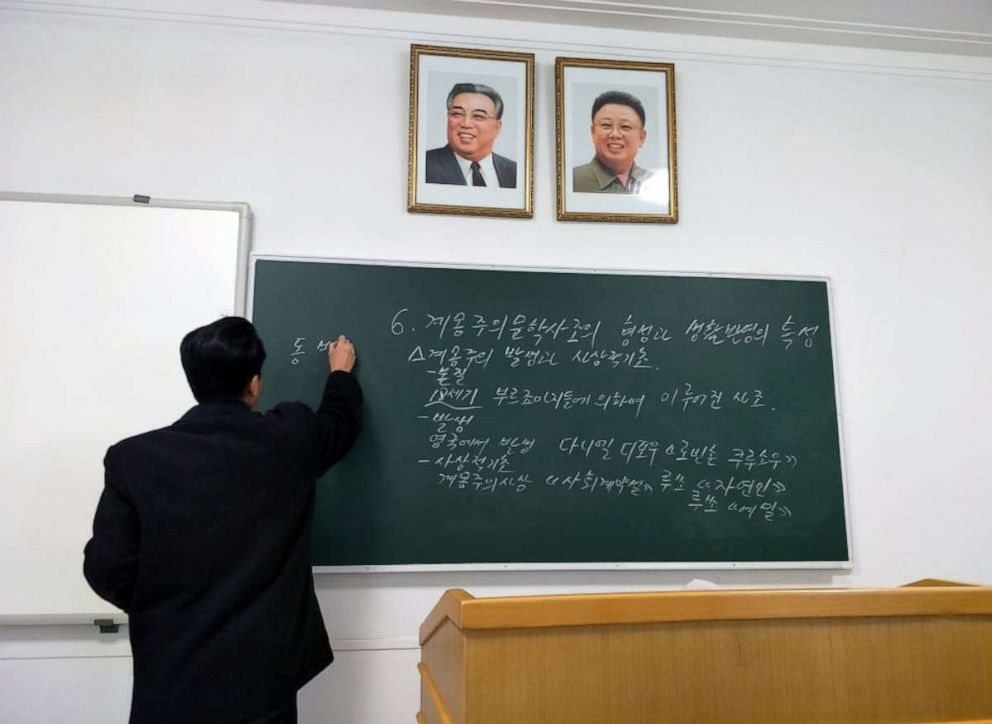
One fact that seems to be present in both South and North Koreans is that the decades of colonization and occupation left the country shattered and traumatized. The Korean War is a clear example of how redrawing borders and “owning” countries can lead to collateral damage that will cause human suffering a century later. It is hard not to question where the country would be today if the US and Soviet Union never decided to split the country in half.
The term “forgotten” is especially misleading when discussing the effects of stalemate that currently still persist. For one, North Korea obtains a drastic humanitarian crisis as almost 200,000 people are locked in starvation camps and the rest are denied basic human rights such as freedom of speech, religion or even thought.
For the lucky few who manage to escape the totalitarian regime and find asylum in South Korea, they are alienated and treated as outcasts as the disdain for the North still resides.
“One of the things that breaks my heart about North Korean refugees is the amount of discrimination they face at the Korean Peninsula and I think that is a direct cause of stalemate” said Lee.
“People still see North Korea as the enemy and anyone who comes from North Korea has to be the enemy so defectors, a lot of time, they’ll be bullied, they’ll be harassed and it’s a direct consequence of them saying they’re North Korean” he added.
Forming diplomatic relations with North Korea is messy, complex and frustrating and the relations between the North and South exist as a game of chicken. The country has the third largest military in the world, owns nuclear capabilities and is supported by their communist ally China making them a significant global threat.
As for the future of North Korea and the Korean Peninsula, it does not appear that any strides towards progress will be made soon. The country has been under tough international sanctions and the United Nations is hoping that this will force North Korea to become warmer to the concept of compromise.
“One of the things that breaks my heart about North Korean refugees is the amount of discrimination they face at the Korean Peninsula and I think that is a direct cause of stalemate”
Jay Lee, USC LiNK President
The greatest change the country has undergone is a slow marketization, but it is dubious that this marketization will ever be released from the grips of the regime to benefit the people.

Professor Yonho Kim- George Washington University
The question lies in whether the future for any resolve of peace is a possibility and the war can finally come to an end.
Yonho Kim, a professor at the George Washington University believes the world is not addressing the humanitarian crisis in North Korea as a priority. President Joe Biden and the United Nations is swamped with the Covid-19 pandemic and South Korea is currently approaching an economic recession and many young adults are facing unemployment. The world is waiting for North Korea to feel desperate enough to be willing to compromise.
“It has been decades since the Clinton administration in 1994, when Kim Il Sung died, made a nuclear deal with North Korea, but here we are” said Professor Kim about the progress in relations between North Korea and the United States.
“Not much progress, just stop and go” he added.
Aside from the loss and trauma faced by these Korean War survivors, they experienced an altering of identity by imperial powers. Their definition as human beings was toyed with. From forced Japanese colonization and assimilation, to quick westernization or backlash of westernization depending on which side of the 38th parallel you resided, to being a refugee and an American immigrant. Their identities were forced to shift radically within a short period of time.
The past and present consequences of the Korean War are countless and cannot be summed up in the term “forgotten”. When asked about the war being described as “forgotten” my grandfather said this:
“We don’t forget, but I think America may be forgetting”.
Timeline of Korean War
Japan colonizes korea
After years of war and intimidation, Japan annexes Korea. Koreans are forced to change their names, speak Japanese and live as secondary citizens. Hundreds of thousands of women are put into concubines as sex slaves for Japanese soldiers
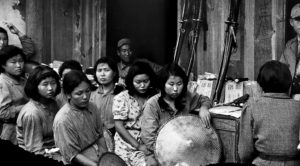
wwII Ends, Korea is split at the 38th paralel
With the end of World War II, Korea is finally liberated from Japanese rule. However the country is not given independence. Instead, the US and the USSR decide to split Korea at the 38th parallel giving the North to the USSR and the South to the US.
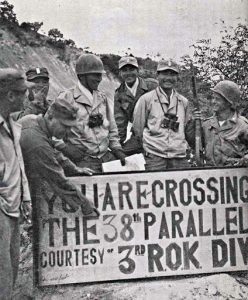
two countries
The Republic of Korea is established in the South and the Democratic People’s Republic of Korea is established in the North.
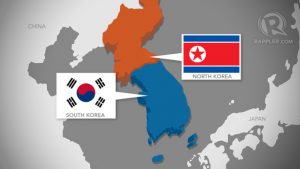
Jeju uprising
Koreans residing on the island of Jeju held demonstrations for the unification of Korea and the removal of US troops. After hundreds of protestors were detained, the uprising turned violent. The military suppression of these civilians left nearly 30,000 people massacred.
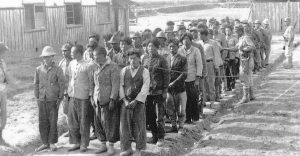
the war begins
Kim Il-Sung, leader of the Democratic People’s Republic of Korea, crosses the 38th parallel with his troops and invades the city of Seoul.
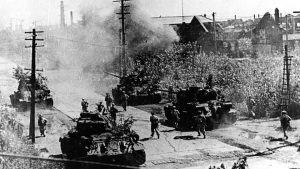
un troops challenge North korean forces
UN troops quickly decrease the strength of the North Korean army. The UN has reduced the territory under Communist control to the city of Pusan. Three days later, Seoul is liberated by the UN under General Douglas MacArthur.
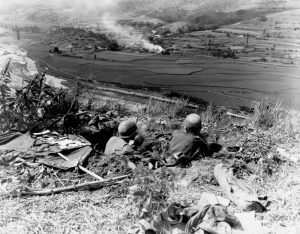
china gets involved
UN forces have pushed the Communists all the way to the Chinese border by the Yalu River. However, General MacArthur goes against orders and bombs the Chinese bases who were providing supplies to the North Koreans. Chinese troops then march into action and push South Korean troops all the way to the South by the Chongchon River.
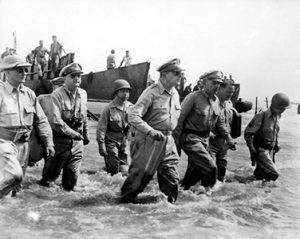
battle of chosin reservoir
The US Marines find themselves in combat against two large Chinese armies. Although the South lost the territory, the US Marines were able to greatly weaken Chinese forces. This battle is a historical achievement for the US Marines and is often called “The Frozen Chosin” or “The Escape of Chosin”.
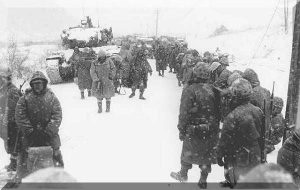
goodbye macarthur
President Harry S. Truman replaces MacArthur due to his unwillingness to take orders and for his disastrous decision to bomb Chinese bases.
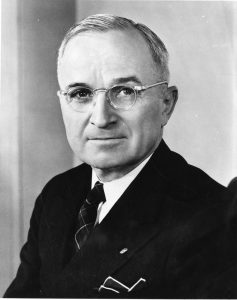
negotiations begin
The UN and the Communists begin to talk about a peace treaty. Fighting continues for two more years and roughly remains around the 38th Parallel.
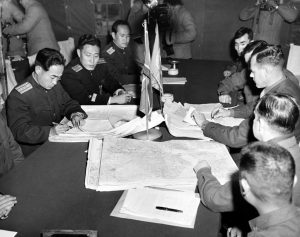
ceasefire
China, North Korea, and the UN agree to an armistice. The demilitarized zone is marked at the 38th Parallel, where the war began. Although there was an armistice, no peace treaty was ever signed.
